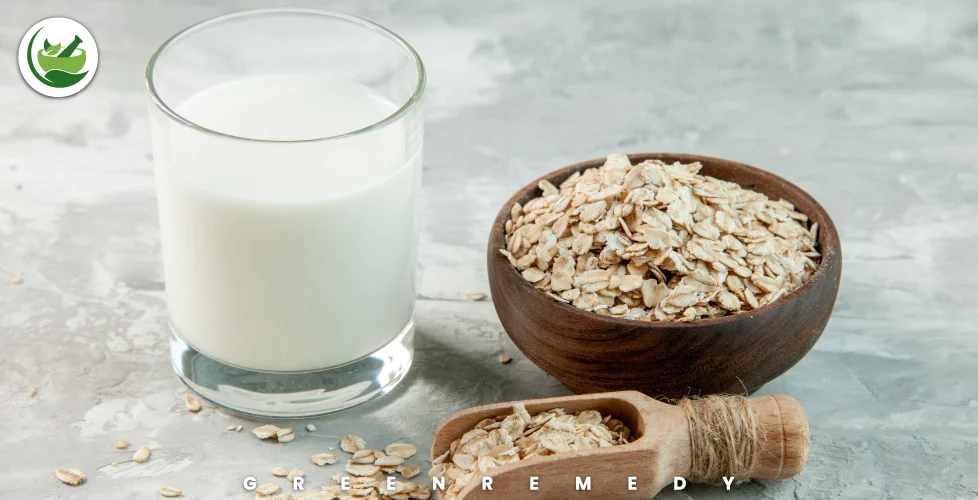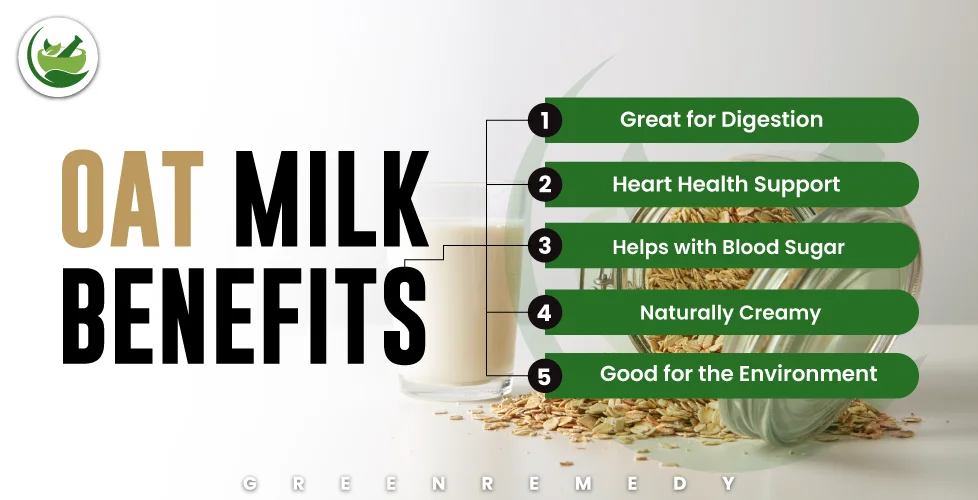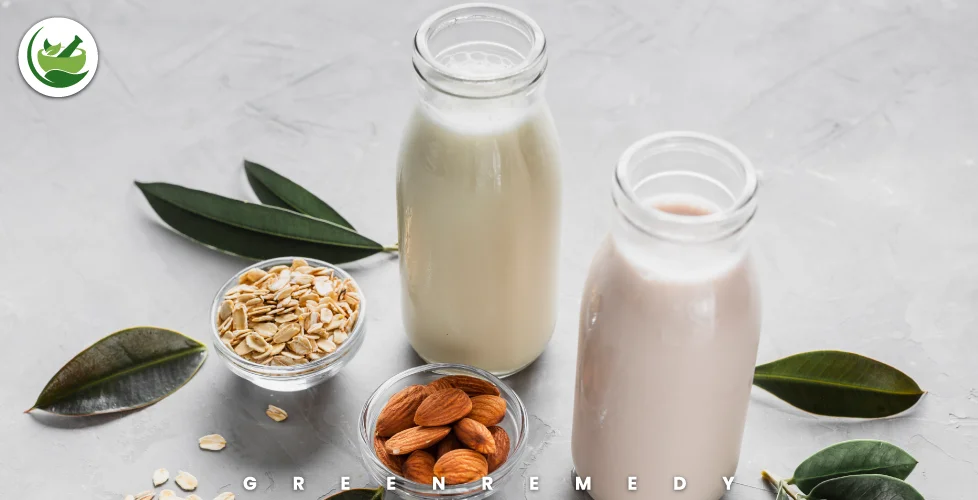
In today’s fast-paced world, more people are switching to plant-based alternatives for a healthier lifestyle. Among these, oat milk has quickly risen to the spotlight as one of the most popular non-dairy choices. It’s creamy, delicious, and loaded with nutrients, making it an excellent substitute for traditional cow’s milk. Whether you’re lactose intolerant, vegan, or simply looking for healthier choices, oat milk offers numerous benefits worth exploring.
👉 Ready to transform your diet with a dairy-free alternative? Keep reading to discover why oat milk might be the perfect addition to your daily routine.
What Is Oat Milk?
Oat milk is a plant-based beverage made from whole oats and water. It’s naturally free from dairy, soy, and nuts, making it suitable for people with food allergies or dietary restrictions. Unlike some other plant-based milks, oat milk has a naturally sweet and creamy texture, which makes it perfect for coffee, smoothies, and baking.
Many brands fortify oat milk with vitamins like B12, calcium, and vitamin D, so you’re not missing out on essential nutrients when making the switch.
Read More: How to Make the Perfect Oats Porridge Recipe with Fruits
Is Oat Milk Good for You?
One of the most common questions people ask is: “Is oat milk good for you?” The short answer is yes. Oat milk provides a wide range of health benefits, especially when compared to traditional dairy milk.
Here are some reasons why:
- Rich in Nutrients: Oat milk is naturally high in fiber, which helps improve digestion and supports heart health.
- Low in Allergens: Since it’s nut-free and soy-free, it’s a safer choice for those with common food allergies.
- Good for the Heart: Oats contain beta-glucan, a type of soluble fiber known to lower cholesterol levels.
- Supports Weight Management: Unsweetened oat milk has fewer calories than whole dairy milk, making it a lighter choice for people watching their weight.
- Vegan-Friendly: 100% plant-based, oat milk is ideal for those following a vegan diet.
How to Make Oat Milk at Home
You don’t always have to buy oat milk from the store. Learning how to make oat milk at home is simple and cost-effective. Here’s a quick oat milk recipe you can try:
Ingredients:
- 1 cup rolled oats
- 4 cups filtered water
- Sweetener (optional – maple syrup, honey, or dates)
- A pinch of salt
Instructions:
- Blend oats and water in a high-speed blender for 30–40 seconds.
- Strain through a nut milk bag or a clean cloth to remove excess pulp.
- Add sweetener or flavorings if desired.
- Store in a glass bottle in the fridge for up to 5 days.
This homemade recipe allows you to control the sweetness and flavor while avoiding added preservatives found in store-bought versions.
Tips for the Best Oat Milk
- Use cold water, not warm, to avoid a slimy texture.
- Don’t over-blend—30 seconds is enough.
- Strain twice if you want extra-smooth oat milk.
- Save the leftover oat pulp for baking, smoothies, or oatmeal.
Read More: How to Make Strawberry Overnight Oats: A Step-by-Step Recipe for Beginners
Oat Milk Benefits You Should Know

Let’s dive deeper into the oat milk benefits that make it such a healthy dairy alternative:
1. Great for Digestion
Oats are naturally rich in soluble fiber, which promotes healthy digestion and helps prevent constipation.
2. Heart Health Support
Beta-glucan fiber in oats can lower LDL cholesterol, reducing the risk of heart disease.
3. Helps with Blood Sugar Control
Oat milk has a lower glycemic index compared to regular milk, which means it won’t spike your blood sugar as much.
4. Naturally Creamy & Delicious
Unlike some plant-based milks that feel watery, oat milk has a naturally creamy texture, making it ideal for lattes and cooking.
5. Good for the Environment
Oat milk production uses less water and resources compared to dairy and almond milk, making it a sustainable choice.
Oat Milk Nutrition Breakdown
When comparing oat milk to other alternatives, its nutritional profile really stands out. Here’s what you typically get in one cup (240 ml) of unsweetened oat milk:
| Nutrient | Oat Milk (Unsweetene) | Almond Milk (Unsweetened) | Cow’s Milk (Whole) | Soy Milk (Unsweetene) |
| Calories | 90–120 | 30–50 | ~150 | ~80–100 |
| Protein | 2–3 g | 1 g | 8 g | 7–9 g |
| Carbohydrates | 15–20 g | 1–2 g | 12 g | 4–5 g |
| Fat | 2–5 g | 2.5 g | 8 g | 4–5 g |
| Fiber | 2–3 g | <1 g | 0 g | 2 g |
| Calcium (fort.) | 25–30% DV | 20–25% DV | 25–30% DV | 20–30% DV |
👉 Wondering about oat milk calories? They’re generally lower than whole dairy milk but slightly higher than almond milk. Still, the natural fiber and nutrients make oat milk a balanced choice for most diets.
Oat Milk vs Almond Milk: Which One Is Better?

When it comes to choosing between oat milk vs almond milk, both have their advantages:
- Oat Milk: Higher in carbs, fiber, and creaminess. Great for lattes, smoothies, and recipes.
- Almond Milk: Lower in calories and carbs, but less creamy. Works well for those on low-carb diets.
If you’re looking for a more filling and creamy option, oat milk wins. But if your goal is to cut calories, almond milk may be a better fit.
Oat Milk in Coffee, Smoothies & Recipes
One of the best things about oat milk is its versatility. You can use it in:
- Coffee & Lattes: Froths well, giving you that café-style latte at home.
- Smoothies: Adds creaminess without overpowering fruit flavors.
- Baking & Cooking: Works as a 1:1 substitute for dairy milk in most recipes.
- Cereal & Overnight Oats: Perfect for breakfast lovers.
Read More: The Ultimate Breakfast Hack: Overnight Oats with Protein Powder for Sustained Energy
Uses of Oat Milk
A versatile dairy-free choice for cooking, baking, and more.
1. Breakfast Bowls
Oat milk is perfect for pouring over cereal, granola, or overnight oats. Its naturally creamy texture pairs well with fruits and nuts.
2. Baking Recipes
It works as a 1:1 substitute for dairy milk in cakes, muffins, pancakes, and bread, keeping baked goods soft and moist.
3. Cooking & Sauces
Use oat milk in soups, curries, pasta sauces, or casseroles for creaminess without the heaviness of dairy.
4. Desserts
Oat milk is a popular choice for puddings, custards, ice creams, and other dairy-free sweet treats.
5. Savory Dishes
It can replace milk in mashed potatoes, creamy risottos, and savory pies, adding smooth texture and flavor.
6. Skin & Beauty DIY
Beyond the kitchen, oat milk can be used in homemade face masks or baths for its soothing and moisturizing properties.
Oat Milk for Weight Management
If you’re keeping an eye on your calorie intake, oat milk calories are something to consider. While oat milk has slightly more calories than almond milk, it’s more filling thanks to its fiber content. This helps reduce unnecessary snacking and supports weight management in the long run.
Who Should Avoid Oat Milk?
- People with gluten intolerance or celiac disease – unless the oat milk is certified gluten-free.
- Those on low-carb or ketogenic diets – oat milk is higher in carbs than other alternatives.
- Individuals with blood sugar concerns – sweetened oat milk can cause spikes in glucose levels.
- Anyone monitoring calorie intake closely – flavored or barista blends may contain added sugars and oils.
👉 Tip: Always check the nutrition label to ensure the oat milk aligns with your dietary needs.
Potential Downsides of Oat Milk
Like any food, oat milk isn’t perfect. Here are a few things to keep in mind:
- Higher in Carbs: Not ideal for strict low-carb diets.
- Store-Bought Additives: Some brands add sugar and stabilizers, so always check the label.
- Homemade Shelf Life: Homemade oat milk doesn’t last as long as store-bought versions.
Tips for Buying the Healthiest Oat Milk
When choosing oat milk, always opt for unsweetened varieties to avoid excess sugar. Check if the product is fortified with calcium, vitamin D, and B12, especially if you are replacing dairy. A shorter ingredient list with oats, water, and essential nutrients is best, while minimizing oils, gums, or stabilizers. For everyday use, stick to standard oat milk, as barista blends often contain added fats for frothing. Finally, compare nutrition labels—healthy oat milk should provide around 90–120 calories, 2–3g protein, and some fiber per cup.
Read More: How to Customize Your Peanut Butter Overnight Oats for a Week’s Worth of Breakfasts
FAQ’s
Your most common questions about oat milk.
1. How healthy is oat milk for you?
Oat milk is a nutritious dairy-free option, rich in fiber and often fortified with vitamins and minerals. It supports digestion, heart health, and is suitable for most diets.
2. Is oat milk healthier than almond milk?
Oat milk is creamier and higher in fiber and carbs, while almond milk is lower in calories. The healthier choice depends on your dietary needs and goals.
3. What is the healthiest milk to drink?
The healthiest milk varies by individual, but unsweetened plant-based options like oat, almond, or soy milk are excellent low-calorie, nutrient-rich choices.
4. Why are people ditching oat milk?
Some avoid oat milk due to its higher carb content, added sugars in certain brands, or concerns about blood sugar spikes.
5. What is the warning about oat milk?
The main caution is that sweetened oat milk can be high in added sugars, which may impact blood sugar and overall calorie intake.
Final Thoughts
From its impressive nutrition profile to its creamy taste, oat milk is one of the best dairy alternatives available today. It’s heart-friendly, easy to digest, and better for the environment. Whether you’re curious about oat milk benefits, looking up how to make oat milk, or comparing oat milk vs almond milk, one thing is clear—oat milk is here to stay.
👉 If you’re ready to make the switch, start small—replace your regular milk with oat milk in your coffee or smoothie today. Experience the creamy, healthy, and eco-friendly benefits for yourself.






